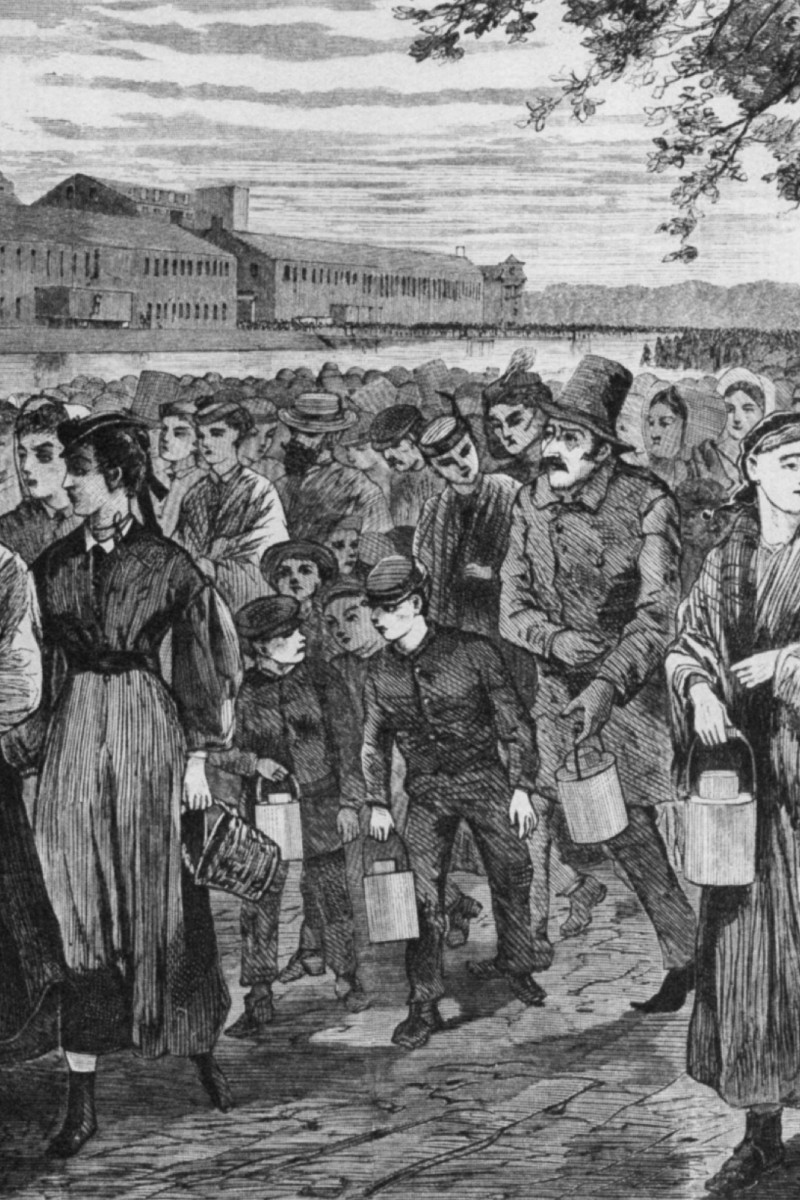 One job that no longer exists is factory lector, someone who would read aloud to factory workers who worked long hours to keep them awake. Photo: Wikimedia Commons
One job that no longer exists is factory lector, someone who would read aloud to factory workers who worked long hours to keep them awake. Photo: Wikimedia CommonsThe nature of jobs has changed a lot over the centuries, with many disappearing due to technological advancement or simply because they are no longer needed. Did you know that many years ago there were people who kept their ears open for approaching enemy planes? Or that there were muffin men going from house to house selling baked goods? Here are some jobs that were popular many decades ago but have since died out.
Knocker-upper
Before alarm clocks, knocker-uppers would go around waking people up. They would use a bamboo stick to knock on windows and doors at their customers’ houses. Known as human alarm clocks, these were hired to make sure people could get to work on time. This was a common job in some industrial cities in Britain during the early 19th and 20th centuries because factory workers did shifts and had to be woken up at odd times. Knocker-uppers were, of course, replaced by bedside alarm clocks once they became cheaper and much more reliable.
The 8 cutest and most famous cats on Instagram to follow on International Cat Day 2019
Factory lector
In the late 1800s, factory workers used to work long hours and they would often fall asleep at their job. To keep themselves awake (and entertained), they would often collect money to hire a lector who would read aloud to them while they worked. Factory lectors were usually educated men who were also good at imitating different voices. This was a well-paid job, but then radio happened.
Groom of the stool
This unusual job is also the most desired one on this list. The groom of the stool was originally a male servant who assisted the king in taking off his clothing while he sat on the “stool” – a chair with a hole in the seat and a pot underneath that was used as a toilet. Apart from chatting to the king while he did his “business” (pooping), the groom of the stool was in charge of monitoring his diet and bowel movements. The intimate nature of this job meant that the king trusted that person very much, and they were often feared by other members of the royal court. The last person to hold this title was James Hamilton, second Duke of Abercorn, and he served the Prince of Wales from 1866 to 1885.
A close stool (or early type of portable toilet) circa 1650. Photo: Wikimedia Commons
The muffin man
Going from house to house with an apron around his waist and a tray of delicious, freshly-baked muffins and crumpets balanced on his head, the muffin man was a welcome sight every morning during Victorian times in England. These hawkers usually made their presence known by ringing a handbell. Muffin men were so popular they even had a nursery rhyme, The Muffin Man, written about them. Sadly, they were no longer needed as bakeries began to spring up all over the country.
9 incredible historical female figures you should know more about
Leech collector
Collecting leeches used to be a job in the 1700s and 1800s, when the worms were widely used in bloodletting (a medical treatment that involved removing blood from a patient to prevent or cure an illness). Leech collectors, mostly women, would gather leeches from ponds by attracting them with their bare legs or horses that were too old for physical labour. They would then pick off the bloodsucking creatures and sell them to doctors. This was a seasonal job because leeches could only be found in the warmer months. Most people did not want this job, because not only were leech collectors badly paid, they usually suffered from infections caused by the worms. Leech therapy is still used today. These days, though, the blood suckers are grown and kept in laboratory-like settings until they are needed.
Aircraft listener
Before radar became available in 1935, specially trained aircraft listeners used listening devices and acoustic mirrors (devices used to reflect and focus sound waves) built into cliffs to listen to the sound of approaching enemy aircraft. As you might have guessed, these methods were not very effective. Also, the increasing speed of aircraft in the late 1930s meant it was often too late to do anything by the time enemy planes were spotted.
It's pretty impossible not to hear everything with these bad boys. Photo: Wikimedia Commons
Scribes
Education was a privilege in ancient Egypt, and not everyone could learn to read and write. Only a special group of people was allowed to do so. Boys were sent to school at a young age to read and write hieroglyphic scripts.All the hard work was worth it though: scribes didn’t have to pay taxes, join the military or do any manual labour. The best ones could even work in the pharaoh’s court.

